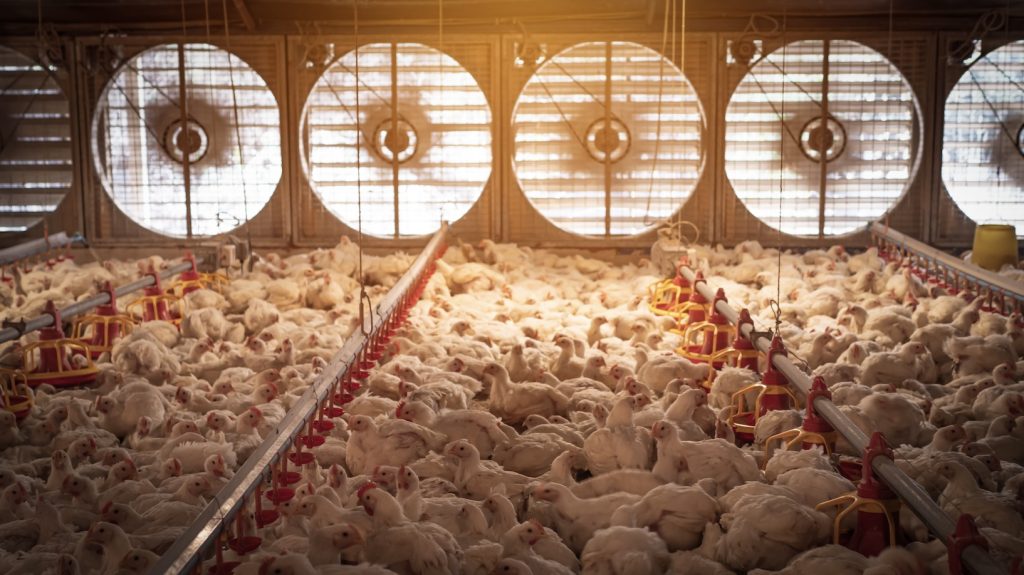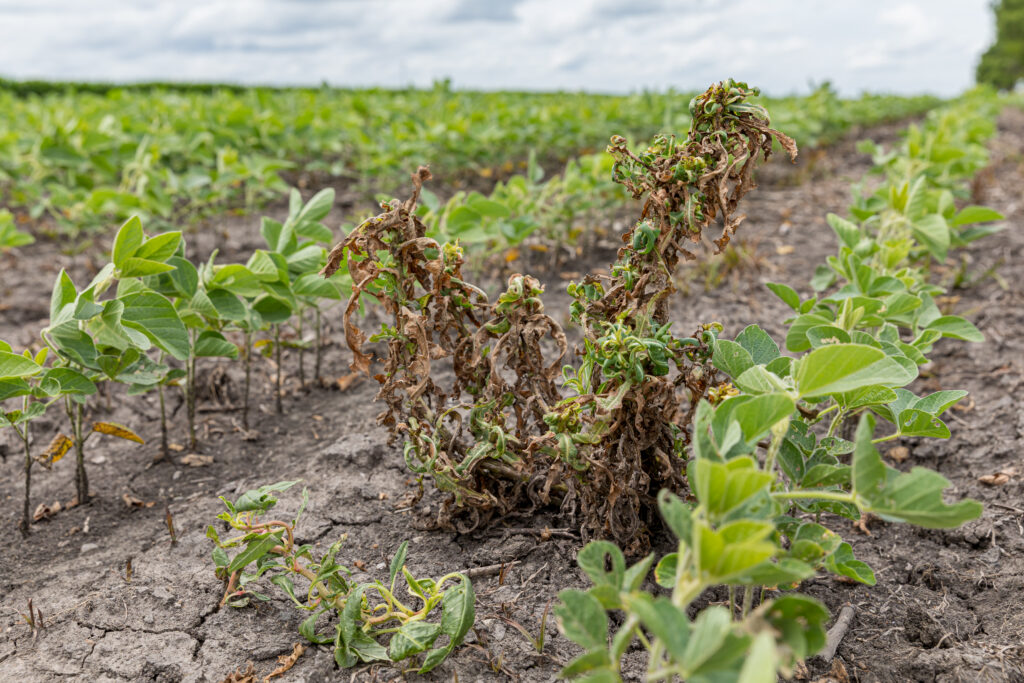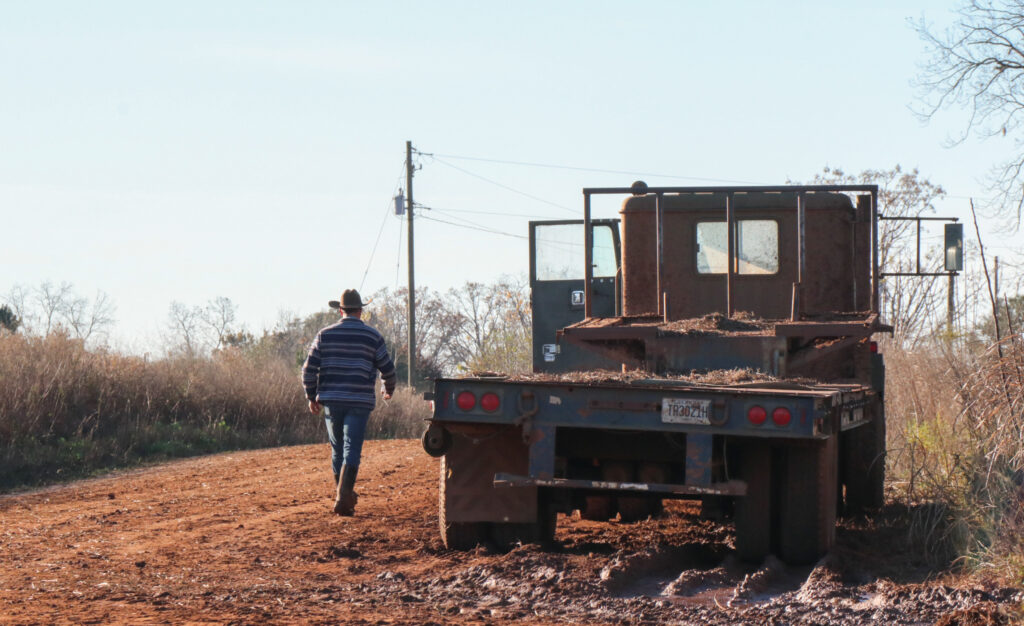Reposted from: https://civileats.com/2024/10/08/for-contract-farmers-the-election-could-change-everything-or-nothing-at-all/
This spring, Minh and Nhu-Hai Ngo were so stressed out by being at home on their farm in Vienna, Georgia, they made plans to visit family in Vietnam. When they spoke to Civil Eats, Nhu-Hai was already there. Minh, a soft-spoken farmer, was getting ready to join her. He sounded defeated.
“I go outside, look at the [chicken] houses, and it’s just empty,” he said. It was the first time in nearly eight years that the houses weren’t packed with birds owned by Tyson, a $21 billion company.
Minh started raising chickens in 2016, when he and Nhu-Hai took out a federal loan to purchase a farm with eight long metal barns built for housing poultry. Every few months, Tyson employees dropped off chicks and feed. They came back six weeks later to fetch fattened birds ready for slaughter.
After five years, in 2021, Tyson demanded that Minh install new fans and controllers in the houses, even though the old ones worked just fine, said Nhu-Hai, who handled the finances. So, despite the debt they still had from the initial farm purchase, the couple took out another loan. Less than three years after that—in October 2023—a Tyson production manager sent a letter with an ominous heading: “RE: Expiration and subsequent non-replacement of Broiler Production Contract.” Tyson was ending its relationship with the Ngos, effective January 26, 2024.
Ever since, Minh and Nhu-Hai have been fretting over how to come up with the money to pay back the bank. They put the farm on the market, but Nhu-Hai said it’s now nearly worthless, without an accompanying contract to grow chickens. (There is little else, after all, that one can do with eight windowless metal barns, each longer than a football field.)
“They give you just enough to survive every day—that’s it,” Minh said, of Tyson’s approach to compensation. “And then they make sure you spend any money on the houses.” Tyson did not respond to a request for comment.
For the Ngos, the situation is uniquely and intimately distressing. However, it’s a common story among America’s chicken farmers, because companies set up the system to place the risk of capital investments on farmers, while they control pretty much everything else. And as the industry has become more consolidated, their power has grown.
Over the past three decades, under both Democrat and Republican administrations, concentration across the meat industry has accelerated. In 1992, the top four chicken companies controlled 41 percent of the market; today, they control 60 percent. In pork, those numbers are 43 vs. 67 percent. In beef, 71 vs. 85 percent.
Economists predict market abuses are likely to occur when control by the four top players in any sector exceeds 40 percent. “What a monopoly does . . . is it uses its market power to raise prices for consumers or to raise prices in a stealthy way by reducing quality,” explained Christopher Leonard, author of The Meat Racket, while moderating a virtual Farm Action event called “Justice for America’s Poultry Growers” in July. “At the same time, on the other end of the ledger, they suppress what they pay producers . . . and they capture the profits that are in the middle. It’s a pretty simple playbook.”
Now, as the election approaches, many experts and farmers say the outcome could determine whether the farm economy continues toward consolidation and monopoly, or whether—if the next administration enacts policies to restore a more competitive marketplace—it shifts power away from corporations and toward farmers.
They’ve got good reason: Upon taking office, the Trump administration immediately scrapped rules meant to protect farmers and was generally passive on antitrust enforcement. Meanwhile, shortly after being sworn in, the Biden Administration announced it would tackle consolidation with an executive order on “promoting competition in the American economy.” The order included a long to-do list for Secretary of Agriculture Tom Vilsack to, among other goals, “address the unfair treatment of farmers” and a directive for the chair of the Federal Trade Commission (FTC) to “address the consolidation of industry in many markets across the economy.”
Some farmers and advocates say the Biden administration has delivered on an impressive number of those priorities, while others see its passionate rhetoric as disguising a lack of meaningful progress. Many predict that as president, Vice President Kamala Harris is likely to advance efforts to confront consolidation in meatpacking, but without a formal policy document, it’s hard to know exactly how. Most say that despite Trump’s populist language and popularity among commodity farmers, his focus on deregulation and actions during his first term point to a future with more power for meatpackers and less for contract farmers.
Industry groups that represent the biggest companies, including the National Chicken Council and the Meat Institute have repeatedly pushed back on the characterization of consolidation and harms to contract farmers as an issue, calling the Biden Administration’s efforts “a solution in search of a problem.”
However, experts like Austin Frerick—author of Barons and former co-chair of the Biden campaign’s Agriculture Antitrust Policy Committee—say the problem of consolidation and its multiple impacts on Americans represents a real opportunity for candidates. “The piñata is so big, and it’s saying, ‘Hit me, hit me,’ especially in meat markets,” he said. For example, recent reports show that some of the largest meat companies including Tyson and JBS USA have used their power to skirt child labor laws and to fix prices, raising the cost of groceries. “Someone’s eventually going to latch onto this. The politics are just too good.”
A Century of Regulatory Inaction
“(The companies) say we’re independent, but we’re not independent,” said Jonathan Buttram, a former contract chicken farmer who is now president of the Alabama Contract Poultry Growers Association, during the Farm Action event. “How can we be independent when we have the debt, we have all the dead chickens, and that’s basically all we have? They own everything else. They make you feel like a sharecropper.”
Americans have been here before. Worker abuses perpetrated by turn-of-the-century meat barons prompted Congress to pass the Packers & Stockyards Act in 1921, in part to “assure fair competition and fair trade practices, to safeguard farmers and ranchers.”
More than 100 years later, however, after a mind-numbing series of false starts, there were still no rules on the books to enforce the law when President Biden took office. Former President Trump is partially responsible: During the Obama administration, Secretary Vilsack got some rules started, but Trump immediately threw them out when he took office. Trump then went a step further, dissolving the office that was set up to enforce Packers & Stockyards and moving oversight of the law to the U.S. Department of Agriculture’s (USDA) Agricultural Marketing Service (AMS).
“AMS’s job is basically promoting the largest corporations, including meatpackers and grain traders, so to say, ‘You have to hold these companies accountable, but your bigger mission is to promote those companies,’ that gave us a lot of concern,” said Angela Huffman, president of Farm Action.
When Vilsack came in with a directive from Biden to restart work on Packers & Stockyards, he didn’t reverse that decision. However, under his watch, the USDA has finalized or proposed multiple rules that have earned the support of a wide range of farmer groups, including the National Farmers Union and the American Farm Bureau Federation. “We’ve been really happy that the Biden administration has taken this up,” Huffman said, and she’s been surprised by how vigorously they’ve pursued it. “Our big concern is just with the pace.
A USDA spokesperson said the agency used maximum resources to expedite the pace but that the rulemaking process is complex.
Huffman sees two pending rules as the most important for contract poultry farmers, and notes that if they’re not finalized before the election, an incoming president could throw them out immediately. Given that’s what Trump did the last time around, there’s reason to believe he would do it again, while Harris would likely let them stand. However, support of the rules doesn’t always break down along party lines: Some Republican lawmakers have attempted to roll back progress on the rules by attaching policy riders to legislative packages, while a few Democrats have made requests to slow down the process in ways that echo meat industry requests.
Others are frustrated by the fact that the rules seem to flit around the edges of deeper reform. For example, one of the most controversial aspects of contract farming in the chicken industry has long been the “tournament system,” so called because wages are turned into a competition, with farmers paid based on how fat their chickens are compared to those at neighboring farms. If implemented, the rules could set minimums for base pay and require companies to provide more information on how their pay rate is calculated. The fundamental structure of the tournament system, however, would remain.
Experts at organizations like the Open Markets Institute say that while the rules would help, the system itself is unfair and therefore violates the law and should be banned outright.
The National Chicken Council, on the other hand, says the Packers and Stockyards Act already prohibits anti-competitive practices and that some of the rules would increase costs, including to farmers.
Another rule would require companies to provide more details on the purpose and costs of upgrades when they demand farmers make expensive improvements to chicken houses, like Tyson did with the Ngos in 2021. But Nhu-Hai said there’s only one thing that would really make a difference for farmers: if the pay covered the upgrade. “Otherwise, you still have to be more in debt. It’s not worth it.”
Still, some farmer advocates see big potential in small tweaks to regulations, and Biden’s USDA did deliver on another major priority of independent cattle ranchers: In March, the USDA finalized a new “Product of USA” rule so that meat carrying that label will now have to come from animals born, raised, and processed here. It’s a change that comes after years of work, to ensure American farmers don’t face unfair competition from cheaper imports that carry the USA label.
The Consolidation of Agriculture
During Trump’s presidency, Secretary of Agriculture Sonny Perdue famously told a group of struggling Wisconsin dairy farmers that “In America, the big get bigger, and the small go out.”
Secretary Vilsack’s language couldn’t be more different. Since the USDA released the 2022 Farm Census data earlier this year, statistics on consolidation and the loss of small and mid-size farms have been a fixture in his regular speeches. At a recent Field Day at the Rodale Institute in Pennsylvania, for example, he shared the fact that in 2022, the largest 7.5 percent of farms took in 89 percent of overall farm income, “which means that 1.7 million farms had to share 11 percent.”
He also noted that 544,000 farms have gone out of business since 1981. “If you took every farmer today in North Dakota and South Dakota and added them to the ones in Minnesota and Wisconsin and those in Illinois and Iowa, as well as those in Nebraska and Colorado and those in Missouri and Oklahoma, you’d have roughly 544,000 farmers,” he laid out, for emphasis.
One of the key actions his USDA has taken to save small- and mid-size farms has been to invest in slaughterhouses and processing plants that work with farmers at that scale. The reasoning is simple: If there are more smaller, independent plants to buy and process animals for small farmers, competition will increase and the big packers will have less power.
In January 2022, the USDA announced a plan to invest $1 billion in competitive meat infrastructure. In July of this year, the agency said it had already distributed $700 million to that end.
But many experts say that because the big packers have already gotten so big, new, smaller plants will never be able to compete. “The reality is that the meat markets got more concentrated these last four years. JBS made a purchase. Tyson made a purchase. Cargill got back into the chicken industry,” Frerick said.
A spokesperson for the USDA emphasized that many of the smaller plants have not even opened yet, and that reversing decades of concentration will require a long-term commitment to a whole-of-government approach.
“From the very first days of the Biden-Harris Administration, USDA has been working to promote competition in agriculture by making landmark investments that diversify agriculture processing and support small and rural businesses, modernizing the rulebook under the Packers & Stockyards Act, and implementing wide-ranging policies to address the harms that market concentration poses to farmers and consumers,” the spokesperson said in an emailed statement. “These unprecedented actions will help to bring transparency, choice, and integrity back to the markets and serve the interests of farmers and small- and mid-sized independent processors alike.”
The USDA’s actions on other fronts have strengthened large companies: Vilsack’s USDA, for example, gave Tyson a $60 million Climate-Smart Commodities Grant. Under Trump, Brazil-based JBS, the largest meat company in the world, got the largest pork contract in a program meant to compensate American farmers for trade deficits, netting nearly $78 million. (In both cases, the administrations have said that the money is passed through to farmers.)
Where Frerick thinks real change could happen to reign in consolidation is in antitrust regulation, which the Biden administration has also been pushing forward after appointing antitrust crusader Lina Khan to chair the FTC. Kahn has met with Iowa farmers about consolidation in the fertilizer industry, and in 2023, she led a significant update to the government’s merger guidelines. “The FTC and DOJ [Department of Justice] now have much stronger guidelines. Over time, I think that’s going to make a big difference, regardless of who’s president,” Huffman said.
Looking to November
As to the two candidates angling to move into the White House next year, neither has said much or published detailed positions on meat industry consolidation.
However, Harris recently said she plans to crack down on food industry mergers, and the 2024 Democratic Party Platform mentions concentration and notes the Biden administration’s work to “make livestock and poultry markets fairer and more transparent.” Her past actions also provide some clues: Huffman said that when Harris was a senator, she voted in favor of checkoff reform, another big priority for groups working on curtailing corporate power in the food system.
Frerick said it will all depend on who Harris appoints to lead the USDA. Because while he is emphatically disappointed in the Biden Administration’s performance on corporate consolidation, he thinks much of the failure lies in Vilsack’s ties to industry. If Trump wins, on the other hand, based on the former president’s last term, “everything bad will get turbocharged,” he said. While farmers have become a sort of emblematic picture of a typical Trump voter and many support the former president this time around, across a diverse agricultural landscape, there are also many who agree with Frerick’s opinion.
Carlton Sanders has been advocating for farmers since his Mississippi farm went into foreclosure in 2017, after, he said, the company he grew chickens for drove him out of business using discriminatory practices (which were later documented by the USDA). During the Farm Action event, he told a story of going to D.C. to meet with Trump during his first term. “He checked my case and my records, and he said I should get back to Mississippi and be proud that Koch Foods is providing jobs for the Mississippians. He said he won’t help with nothing, and he did not,” Sanders said. “Donald Trump is definitely not gonna help the chicken farmers.”
The 2024 Republican Party Platform does not mention corporate power, antitrust issues, or farmers in the meat industry.
As for Minh and Nhu-Hai Ngo, at the end of the day, they’re not sure it matters who is in office in Washington. They are desperate to get out of the chicken business altogether, and Minh is thinking about going back to driving a truck. But they also just heard that Tyson sold its local operations to a smaller company that may be offering new contracts to farms in the region. So, they waver as they reason it out: If they can’t sell the barns or make loan payments and a company comes along offering a contract, will the least terrible option be to get back in?
In August, after half a year of empty barns, they were increasingly anxious about their financial predicament. It seemed, Nhu-Hai said, that as long as companies like Tyson could amass unlimited wealth and power, elections would do little to change the course of their future. “Sometimes, I don’t feel like it makes a big difference,” she said.




